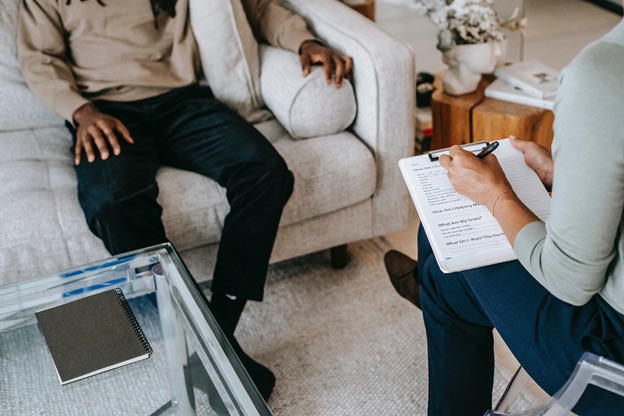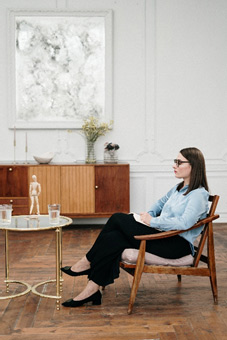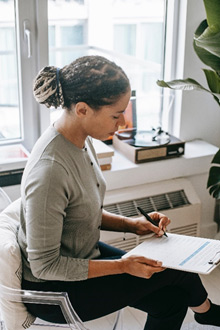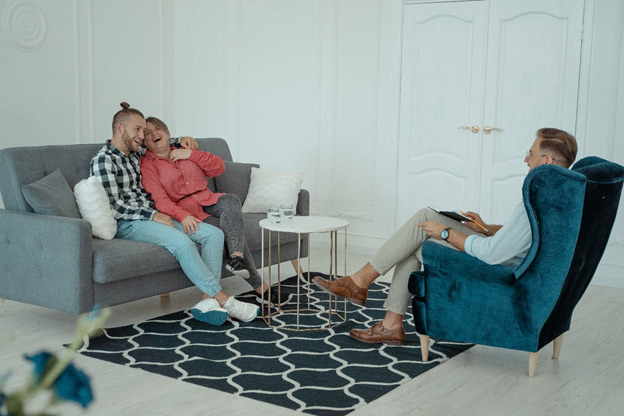
A good couples counselor should possess several qualities to be effective in helping to improve your relationship. Of course it’s important to find the right fit for you which may consist of many factors such as personality, the therapy approach, their areas of focus and the concerns you bring, sense of humor, level of directiveness, etc. But all skilled couples counselors should also have the following qualities:
1. Good communication skills: A good couples counselor should have excellent communication skills to effectively listen to and understand each partner’s perspective. If you visit a counselor and feel like they spend more time talking than understanding your concerns, or they keep misunderstanding your concerns, you might want to try another counselor.
You should leave sessions feeling like you have been heard by the counselor, even if you feel misunderstood by your partner as you are working through your issues. If you’re not sure whether your counselor understands your concerns, you can always ask them; a good counselor will have an idea of useful areas of focus and the ability to summarize the problems you’re sharing (This might take more than one session, so don’t lose heart if you come into counseling feeling like a mess and are not immediately able to figure out with the counselor where to start!)
Relationships are complex and usually have more than one thing going on, so goals may change and be clarified as you work together. A good counselor will work to ensure that you understand their feedback and that they are responding in a way that makes sense to you and your partner.
2. Empathy and Balancing dynamics: A good couples counselor should be able to empathize with the feelings and experiences of both partners without taking sides. Maintaining balance in couples therapy is a critical skill that is needed for each of you to feel heard, understood, and supported in the counseling process. There may be times when the counselor will focus more heavily on a particular partner depending on the areas of concern, the level of commitment of each partner, or certain issues being impacted by other issues, good counselors can carefully manage the focus of the session to ensure your relationship is growing stronger.
 3. Non-judgmental attitude: A good couples counselor should be impartial and non-judgmental, creating a safe and supportive environment for couples to express themselves freely. It’s important to recognize that all counseling is inherently values based and every counselor has their own values and biases—the good ones are aware of their own biases. If a counselor claimed they didn’t have any values that would impact their couples counseling, I would seek someone else as they clearly haven’t done enough of their own self reflection to recognize their own biases. This doesn’t mean that counselors should advise you on your decisions, but they should have clear understanding of their own worldviews so they can best support you in finding decisions that work for your relationship. A good couples counselor will approach you and your partner with compassion even if mistakes or bad choices have been made that impact your relationship.
3. Non-judgmental attitude: A good couples counselor should be impartial and non-judgmental, creating a safe and supportive environment for couples to express themselves freely. It’s important to recognize that all counseling is inherently values based and every counselor has their own values and biases—the good ones are aware of their own biases. If a counselor claimed they didn’t have any values that would impact their couples counseling, I would seek someone else as they clearly haven’t done enough of their own self reflection to recognize their own biases. This doesn’t mean that counselors should advise you on your decisions, but they should have clear understanding of their own worldviews so they can best support you in finding decisions that work for your relationship. A good couples counselor will approach you and your partner with compassion even if mistakes or bad choices have been made that impact your relationship.
4. The ability to recognize and call out abusive dynamics: This is an advanced level skill and often requires experience, supervision, and intentional growth from the therapist. Some abusive dynamics are sneakier and more subtle than others, but a skilled couples counselor should be able to recognize and confront these dynamics so that they don’t continue unchecked. If you believe these dynamics exist in your relationship, you may want to consider looking for a couples counselor who has experience working with personality disordered characteristics as they may be better able to identify and challenge these stressful communication tactics.
A good couples therapist will not allow you or your partner to escalate to the point of screaming at each other in session. You should expect the therapy office to be a safe space where the counselor will mediate unhealthy relationship dynamics and protect you within the office from demeaning behavior or abusive patterns. One caveat to this statement, is that some therapy models begin work by allowing couples to interact largely unchecked with the goal of allowing the therapist to witness and better understand the relationship dynamics; while this can be a useful approach, it should not be the norm on an ongoing basis, as skilled counselors will intervene to teach the couple healthier ways to interact.
5. Flexibility: A good couples counselor should be flexible in their approach, willing to adapt their methods to fit the unique needs and circumstances of each couple. No relationship fits a cookie cutter mold and no approach will work perfectly for every couple and ever relationship issue. Generally speaking, if a counselor said, “this is the activity I do with every one of my couples” I would be a bit concerned about their skill level. There may be standard ways of getting to know new clients, but relationships are complex enough that the approach may need to be tweaked and molded for each relationship.
 6. Respect for confidentiality: A good couples counselor should respect the privacy and confidentiality of each partner, creating a safe space for them to discuss sensitive issues. Counselors ascribe to their licensing boards ethical mandates as well as federal law which provides protection for your privacy. You have certain rights to expect that what you share in session stays there with only a few exceptions which are discussed at the first meeting. If you have questions about your confidentiality, don’t hesitate to ask your couples therapist.
6. Respect for confidentiality: A good couples counselor should respect the privacy and confidentiality of each partner, creating a safe space for them to discuss sensitive issues. Counselors ascribe to their licensing boards ethical mandates as well as federal law which provides protection for your privacy. You have certain rights to expect that what you share in session stays there with only a few exceptions which are discussed at the first meeting. If you have questions about your confidentiality, don’t hesitate to ask your couples therapist.
Equally important is clear respect for the communication between each individual and the therapist. In this sense, the best couples counselors maintain a “no secrets” policy within the couple. Just imagine how betrayed you might feel if your partner not only kept a painful secret from you, but then told the therapist who also kept it from you; it could quickly destroy trust and undermine the whole process of therapy. If your couples counselor meets with you or your partner individually it should be balanced, time-limited, and the therapist should discuss the ground rules before-hand.
7. Good personal boundaries: A good couples therapist should have a clear sense of boundaries that demonstrate respect for your relationship and your time. Some boundaries relate to their professionalism: arriving on time for your appointments and clearly communicating scheduling, payment, and other policies. A good therapist will generally be prepared for your sessions and seek consultation when needed to help your work together.
Additionally, boundaries may include things like an intentional and careful level of self disclosure. Self-disclosure from the therapist (sharing personal details about themselves) can be useful and therapeutic for clients to help you build a more comfortable therapy relationship, bring insight or a new perspective into your areas of concern, or to help you feel less alone in your struggles; however, poor boundaries on the part of the therapist can lead to too much self disclosure which may make the session feel more about the therapist than you. Therapy sessions should be focused on the content that is useful and therapeutic to the clients and your relationship, not about the counselor’s needs.
8. A sense of humor: Maybe this one doesn’t feel that important to you, but I believe this is an invaluable skill for all counselors. Therapy can be challenging and often forces us to take a hard look at the most painful parts of our relationship. Sometimes laughter truly is the best medicine. While it’s good to have this space to explore the hard stuff, it’s equally important to allow moments of levity and hope building. Humor helps us to remember why we choose to do the work even when it’s hard. A good couples counselor will strike a balance between tackling challenging issues and giving you moments to smile and remember why you like your partner.
Humor can help to defuse tension and create a more relaxed and comfortable environment for couples to open up and discuss their issues. When couples are feeling anxious or stressed, a well-timed joke or humorous comment can help to lighten the mood and reduce the emotional intensity of the situation. Secondly, humor can be an effective way to help couples to see their issues from a different perspective. When couples are stuck in a negative cycle of communication, humor can be used to shift their focus and encourage them to view their problems in a more positive light.

By the use of these important qualities, a good couples counselor can help you and your partner to communicate more effectively, understand each other better, and develop a stronger, healthier relationship.
April 2023, Jenny Beall, Counselor, Threads of Hope Counseling
